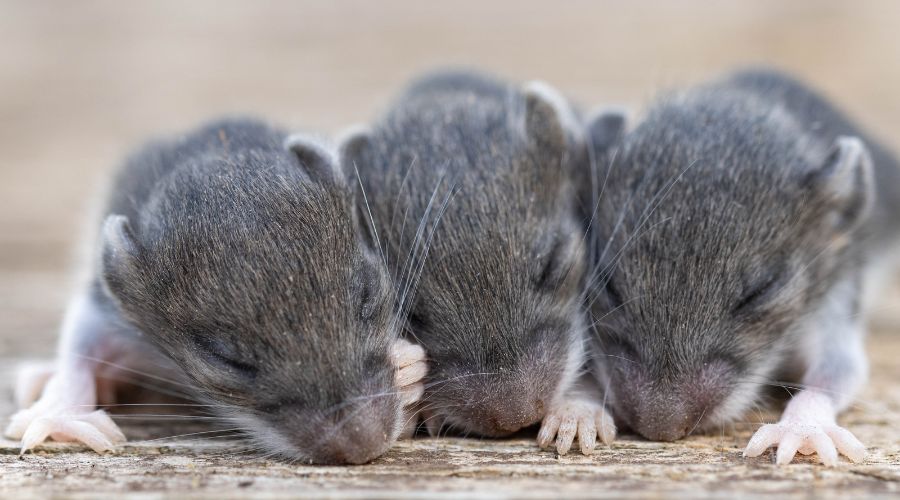Small, slender, and agile mice may not pose an immediate threat, but once they multiply and are left to thrive, these common house pests can wreak havoc like no other over the long term. These creatures can bring immense destruction to any property by chewing through various objects like furniture, insulation, and, at worse, electrical wiring.
It is only the material things they damage, but mice bring a significant health threat to humans as they are vectors for many deadly diseases and infections like the hantavirus.
Their fast rate of reproduction renders it vital that homeowners identify the early signs to prevent a widespread infestation from establishing.
So, how many babies do mice have, and how do you stop a potential infestation in its tracks? Read on to learn more!
Signs You May Have Mice in Your Home
While mice are nocturnal creatures, they may remain hidden out of sight for long periods before you spot them and realize there is a problem. However, rodents behind several telltale signs around homes in Forney, Tx indicating their presence on your property. These mainly include:
Droppings
Mice droppings are small and black with a granular shape, resembling a rice grain. They are most likely present in areas where these rodents nest and feed.
Musky Odor
Areas with mice activity typically emit a pungent, ammonia-like smell produced from their urine.
Unusual Sounds
Mice often produce scratching and squeaking sounds from the walls or ceilings as mice gnaw, dig, or crawl. You are likely to hear these at night when mice activity is highest.
Grease Marks
Mice have oily fur. As they travel from one place to another, brushing themselves across surfaces, they leave behind smear marks produced from the combination of their oil, hair, and dirt.
Spotting Live Mice
If you encounter a mouse or two around your home, there is a high probability there are many more hiding away or a possible infestation.
How Often Do Mice Reproduce?
As stated earlier, mice reproduce at alarming rates. Mice become sexually mature at an average of six weeks of age. The gestation period lasts about three weeks, after which the female mouse is ready to mate again.
That means that it is not impossible for these pests to reproduce about ten times a year. A typical litter consists of up to eight pups, and a single female mouse can give birth to as many as 80 pups a year.
Indoor mice have better breeding capabilities as compared to mice in the wild due to their high chances of survival and little to no threat from predators and other harsh conditions.
How Many Babies Do Forney Mice Have?
As mice breed multiple times a year, the amount of offspring they can have is fascinating. A female mouse is ready to mate within 24 hours of giving birth. It can produce the second litter in as little as four weeks after giving birth to the first one.
On average, each litter comprises six pups; however, litters as big as 12- 14 have also been documented. Their prolific breeding potential demonstrates the lurking risk of a severe infestation and the destruction it can cause if overlooked for a long period.
How to Eliminate Mice and Their Babies
Owing to the severity of damage these creatures can cause, controlling mice as early as possible is indispensable to saving your property from costly repairs and replacements and protecting your health. The following are some viable tips to prevent and eliminate mice from your space:
Maintain Sanitation
As mice are typically attracted to food, filth, and clutter, it is vital to practice good hygiene.
That involves eliminating all food sources that may lure mice into your home by storing them in tightly sealed containers, regularly cleaning food surface areas and mopping down floors to get rid of crumbs and spills, and eliminating excess clutter that may prove a safe spot for these pests to hide and breed.
Mice Deterrents
A simple mice prevention technique is to use deterrents to repel mice. Peppermint oil, mothballs, ammonia-soaked cotton balls, and ultrasonic sound repellents can be convenient yet potent ways to keep mice away.
Mouse-proofing
Perhaps the most long-lasting solution to control mice for the time to come is to mouse-proof your property by sealing all holes, cracks, and crevices, such as those in the foundation or around utility openings.
Bait and Traps
Baits can be useful tools to kill a large number of mice in a short period by poisoning, while traps are more suitable for low mouse populations and ineffective for large infestations.
If all else fails, the most reliable way to control mice is by contacting a pest control exterminator to deal with the problem. Romney Pest Control offers prompt, top-of-the-line treatments through its team of highly experienced and skilled technicians with 100% satisfaction guaranteed.




